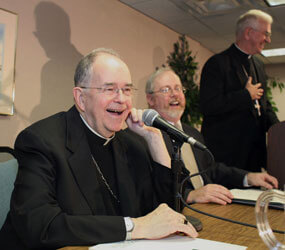LOUISVILLE, Ky. – Archbishop Thomas C. Kelly, who led the Archdiocese of Louisville from 1982 until his retirement in 2007, died peacefully in his sleep on the morning of Dec. 14 at his home on the campus of Holy Trinity Church. He was 80.
Funeral arrangements were not announced immediately.
In a statement released shortly after Archbishop Kelly’s death was announced, his successor, Archbishop Joseph E. Kurtz, praised his brother bishop for his service to the archdiocese.
“With the death of Archbishop Thomas Cajetan Kelly, the local church of Louisville has lost a friend, a humble servant and a dedicated man of God,” Archbishop Kurtz said. “Archbishop Kelly served for more than a quarter century as the archbishop of Louisville and remained active as archbishop emeritus for almost five years.
“In his 80 years of life, he has been thoroughly a priest of Jesus Christ, as a faithful Dominican, as a diplomat and administrator at the nunciature and the U.S. Conference of Catholic Bishops, as metropolitan of the province of Louisville, as a true archbishop, and in these last days as a faithful parish priest.”
Archbishop Kelly, possessed of twinkling Irish eyes and a comforting presence, led the archdiocese through periods of both triumph and tragedy. He was proud of the spiritual growth of the archdiocese, especially the Renew process that began in the 1980s shortly after he came to Louisville. He also took pride in the development of a strategic planning process – also launched in the 1980s – something he called “a very significant beginning in my time.”
The saddest moment of his 25-year leadership of the archdiocese came, he said, with the eruption of the sexual abuse crisis in 2002. “It was,” he noted, “a terrible time … when victims came forward for healing and made us realize the terrible, terrible damage that had been done to them.
“We continue to seek and ask for their forgiveness,” he said in 2007, “to pray that such terrible things may not happen … again and to take every step conceivable to prevent that from happening.”
Brian Reynolds, chancellor and chief administrative officer for the archdiocese, called Archbishop Kelly a “humble servant leader.”
“Working with him, that’s what you experienced,” he said, “his humility and commitment to serve those in need.”
The archbishop, Reynolds said, loved three things:
“He loved his cathedral and took pride in seeing it renovated and back as a beacon of life in this city,” he said. “He loved planning and not just focusing on the present. And he loved the priesthood.”
In fact, the night before he died, Reynolds noted, Archbishop Kelly concelebrated Mass at Holy Trinity Church, and preached. “It’s remarkable, but he was preaching just half a day before his life ended,” the chancellor said.
Archbishop Kelly “was committed to the poor, to Catholic education and to addressing injustice, whether through outreach to refugees or outreach to prisons,” Reynolds noted. “Those are things he loved and that’s what he did.”
The retired archbishop was born in 1931 in Rochester, N.Y., and entered the Dominican order in 1951 after studying for two years at Providence College. He was ordained a priest in 1958 and received a licentiate in theology degree from the Dominican House of Studies in Washington in 1959. He also received a doctorate in canon law from the University of St. Thomas in Rome in 1962 and studied at the University of Vienna in Austria and at Cambridge University in England.
Joseph Duerr, retired editor of The Record, Louisville archdiocesan newspaper, recalled his 25-year history with Archbishop Kelly – he covered both his 1982 installation as Archbishop of Louisville and the archbishop’s retirement in 2007 – and said what he most remembers about the archbishop is his scholarly nature.
“I think that his pastorate was marked by renewal and growth,” Duerr recalled in a telephone interview Dec. 14. “One of the things that struck me about him personally is that he was very intelligent, a scholar. He was fully aware of having been general secretary of the bishops’ conference before he came here. He was in touch with the many issues in the church nationally, and he brought that awareness with him when he came here.”
But if asked to describe the late archbishop in one word, Duerr said, that word would be “scholar.”
“That had a lot to do with his education in the Dominican community, and he brought that scholarly view of the church with him to Louisville,” the retired editor said. “At the same time, he was very pastoral, too. He was never aloof from people, he very much identified with individuals and was open to them.”
At the time of his installation as archbishop of Louisville, Archbishop Kelly told about 5,000 people who were gathered that February day in 1982 that “I am to be the servant of your faith.”
In his homily at the installation Mass, he told his church that he was thinking “of the unborn and the incessant destruction of human life.”
“Too many members of the human family … are subject to conditions that are offensive to their life, to their dignity and to the aspirations that are rightfully theirs,” he said in his homily.
Respect for life “embraces many issues,” he said in a 1999 article in The Record. “Poverty, malnutrition, hunger, war, sexual exploitation, the arms trade, abortion, racism, unchecked individualism and materialism, capital punishment and euthanasia all contribute to a ‘throw-away’ society and to tremendous suffering.”
Archbishop Kelly also stressed lay ministry and he “reinvigorated the Catholic Conference of Kentucky in his years as archbishop,” Duerr noted. “Education was another thing he stressed, as was life-long formation. Then you had the restoration of the cathedral during his time … but the notion of renewal and growth touched all aspects of his pastorate.”
Copyright © 2011 Catholic News Service/U.S. Conference of Catholic Bishops


